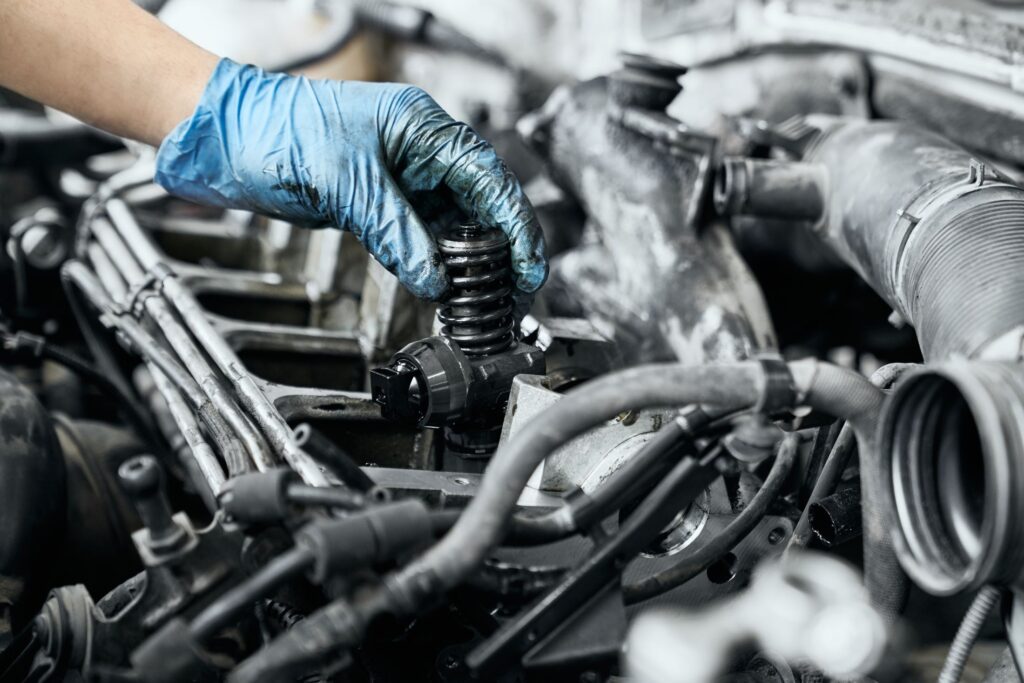Diesel engines are renowned for their durability, fuel efficiency, and power, making them a popular choice for many vehicle owners. However, like any engine, they require regular maintenance to keep running smoothly. Here are four essential tips to help you keep your diesel engine in top condition.

Tip #1: Regular Oil Changes
Oil is the lifeblood of any engine, and this is especially true for diesel engines. Regular oil changes are crucial for maintaining engine health and performance.
- Follow Manufacturer’s Recommendations: Adhere to the oil change intervals specified in your vehicle’s owner’s manual. Typically, diesel engines require oil changes every 5,000 to 7,500 miles, but this can vary based on the make and model of your vehicle.
- Use High-Quality Oil: Always use the type and grade of oil recommended by the manufacturer. High-quality diesel engine oil contains additives that help protect against wear, reduce deposits, and maintain viscosity.
- Monitor Oil Levels: Regularly check the oil level and top it off if necessary. Low oil levels can lead to increased friction and wear, causing engine damage over time.
Tip #2: Keep the Fuel System Clean
The fuel system in a diesel engine is more complex and sensitive than in gasoline engines. Keeping it clean is essential for optimal performance.
- Use Quality Diesel Fuel: Always use high-quality diesel fuel from reputable sources. Low-quality fuel can contain contaminants that clog the fuel system and injectors.
- Add Fuel Additives: Consider using fuel additives that clean the fuel system, remove water, and improve lubrication. These additives help maintain injector performance and prevent the buildup of deposits.
- Change Fuel Filters Regularly: Diesel engines are equipped with multiple fuel filters to keep the fuel clean. Replace these filters according to the manufacturer’s schedule to ensure a clean fuel supply and prevent clogs.
Tip #3: Maintain the Air Intake System
A clean and efficient air intake system is vital for the performance and longevity of your diesel engine.
- Replace Air Filters: The air filter prevents dust, dirt, and debris from entering the engine. Replace the air filter regularly to ensure proper airflow and prevent contaminants from damaging the engine.
- Inspect and Clean the Turbocharger: If your diesel engine is turbocharged, regularly inspect and clean the turbocharger. Deposits on the turbocharger can reduce its efficiency and lead to performance issues.
- Check for Leaks: Inspect the air intake system for leaks that can allow unfiltered air into the engine. Fix any leaks promptly to maintain engine health.
Tip #4: Monitor the Cooling System
Diesel engines generate a lot of heat, making the cooling system critical for preventing overheating and engine damage.
- Check Coolant Levels: Regularly check the coolant level and top it off if necessary. Low coolant levels can lead to overheating and severe engine damage.
- Flush the Cooling System: Over time, the coolant can become contaminated with rust and scale. Flush the cooling system periodically to remove these contaminants and replace the old coolant with fresh fluid.
- Inspect Hoses and Belts: Check the condition of hoses and belts in the cooling system. Replace any that are cracked, brittle, or show signs of wear to prevent leaks and ensure proper cooling.
Protect Your Diesel Engine with Thunderbird Automotive Specialists
Proper maintenance is key to keeping your diesel engine running smoothly and efficiently. Regular oil changes, a clean fuel system, a well-maintained air intake system, and a functioning cooling system are all essential aspects of diesel engine care. At Thunderbird Automotive Specialists, we provide expert diesel engine maintenance and repair services to help you keep your vehicle in top condition. Contact us today to schedule an appointment and ensure your diesel engine runs smoothly for years to come.


